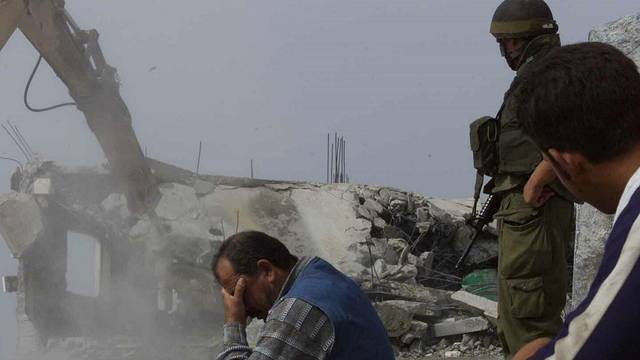 Earlier this week, Israeli Defense Forces destroyed the homes of two Palestinians—Amer Abu Aysha and Hussam Kawasme—and sealed up the home of another, Marwan Kawasme. The three men are suspects in the deaths of three Jewish seminary students—Naftali Fraenkel, Gilad Shaer and Eyal Yifrah—who were killed in the West Bank in June.
Earlier this week, Israeli Defense Forces destroyed the homes of two Palestinians—Amer Abu Aysha and Hussam Kawasme—and sealed up the home of another, Marwan Kawasme. The three men are suspects in the deaths of three Jewish seminary students—Naftali Fraenkel, Gilad Shaer and Eyal Yifrah—who were killed in the West Bank in June.
The kidnapping and murders of Fraenkel, Shaer and Yifrah were followed by the murder of a teenage Palestinian—Mohammed Abu Khdeir—by three Israelis in Jerusalem in July. And all of this played a role in igniting the Israel-Gaza conflict that (despite cease-fires) is still going on today.
It's an ugly situation, made uglier by reports that the killers of Fraenkel, Shaer and Yifrah received funding from Hamas, the terror group that rules Gaza. But what is Israel accomplishing by destroying the homes of the suspects?
Keep in mind that no one has actually been put on trial and convicted of the murders of Fraenkel, Shaer and Yifrah. So, whatever the motive behind this punishment, it's being inflicted without due process.
But, on top of that, it's being inflicted on people who aren't even suspected of being guilty. The family members of these suspects are losing their homes as a result of a crime they didn't commit. That is, Israel is punishing innocents.
This is nothing new. Israel has a long history of destroying the homes of Palestinians suspected of terrorism, and the policy has routinely been described as what it is: collective punishment. (The sins of the father set the son's teeth on edge.) Israel has argued that these demolitions serve as a deterrent, giving families a reason to persuade their relatives away from terrorism. I suppose the demolitions could also counteract any monetary reward given to the families of suicide bombers (Saddam Hussein proudly funded such "awards," and Jordan's Arab Bank is currently on trial in New York for being involved in them as well).
Whatever deterrence Israel's policy of demolishing homes might have, it's not being used to deter Israeli militants. The homes of Yosef Ben-David and the two other Israeli suspects in Khdeir's death haven't been demolished, and likely won't be even if they're convicted. (Notably, Ben-David has declared himself to be the Messiah, and the other suspects are unnamed minors.) Similarly, after Baruch Goldstein gunned down 29 Muslims as they prayed in the Cave of the Patriarchs in 1994, his family wasn't made homeless by the IDF.
So, Israel's policy of destroying homes is done without due process, hurts people who are innocent of wrongdoing (even children), and is only inflicted on Palestinians.
Israel isn't North Korea, and it bristles at the accusation of "apartheid." Certainly, what's going on in the Israeli-Palestinian conflict is different from what happened under South Africa's system of apartheid, which outlawed intermarriage and segregated everything from beaches to hospitals according to race. And, in Hamas, Israel faces an enemy that is bent on mass murder, that targets civilians and that aspires to some sort of ISIS-like state.
But there's no doubt that Israel is engaging in collective punishment against innocents who have no vote in the government that is doing the punishing. Whatever that's called—"apartheid" or not—it's not good.
If Israel wants to kill terrorists, fine. But why can't innocent Palestinians get the same treatment as innocent Israelis?
Alasdair Denvil graduated Virginia Commonwealth University with a B.A. in Philosophy, and attended NYU's graduate program. He has written for Facts on File and PolicyMic. Follow him on Twitter at @AlasdairDenvil.